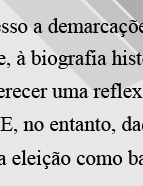

................................
As a multifaceted genre, averse to disciplinary demarcations, and the confluence of different methodologies and models of varying scopes, historical biography is difficult to pin down as a unit in its own right with an autonomy that would warrant a more detailed reflection on its specific place in the history of Portuguese historiography. However, given the exponential multiplication of its products in recent decades and, above all, its election as a banner of the traditionalist turnaround that has recently marked historiography (also) in Portugal, such reflection appears to be necessary.
In this climate of renewal or revision of historiography, much has been said about the recovery of the biographical genre, supposedly "forgotten" and even "disdained" for decades by the academic doxa of grand interpretative and analytical schemes. Therefore, the intention of an ideal model of biography, explicitly defended by some of its most distinguished practitioners, is clearly recognisable in this discourse. Here, one encounters a pronounced preference for characters with relevant public careers (political, diplomatic, or military, and therefore predominantly male) and the use of individualistic methodologies that acknowledge personal will and reason as the driving force of historical action. However, practice is averse to singular models. In fact, despite the apparent traditionalist matrix of the biographical exercise, a broader look at biographical writing throughout the period covered by this Dictionary presents us with a far more complex picture than the barely shaded landscape of that ideal model.
It is a fact that great figures – from the military and royal heroes to the democratised version of the great man, more typical of the second half of the nineteenth century – have always dominated biographical writing in Portugal. These more or less illustrious characters, from the fields of arms and governance to those of science and culture, have never been anything other than those worthy of "consecration" and "remembrance," as later on in the century Oliveira Marques would say of "the great (and small) personalities" of the twentieth century, the profiles of whom it was necessary to outline. But this openness to the realm of creation and intellect, correlated with the progressive entry into history of social groups less accustomed to portrait honours, expanded the universe of biographical subjects and with it, the forms of intervention in historical processes beyond the narrow limits of more conventional historiography (O. Marques, Afonso Costa, 1972: 17-18).
